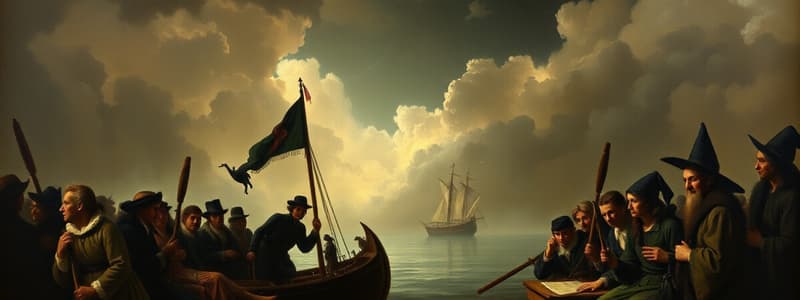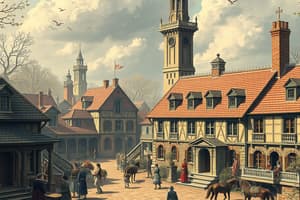Podcast
Questions and Answers
Match the historical events with their descriptions:
Match the historical events with their descriptions:
Bacon's Rebellion = Indentured servants in Virginia revolt against government and landowners Middle passage = The middle portion of the triangular trade that brought African slaves to the Americas Salem witch trials = Accusations of witchcraft led to trials and 18 hangings in Massachusetts Treaty of Paris 1763 = Ended the French and Indian War with Britain dominating North America
Match the legislation with their purposes:
Match the legislation with their purposes:
Proclamation of 1763 = Law forbidding colonists to settle west of the Appalachian Mountains Sugar Act = British tariff on sugar and other goods to reduce debt Quartering Act 1765 = Law requiring colonists to house British soldiers Albany Congress = Meeting to ensure Iroquois loyalty and promote colonial unity
Match the notable figures with their contributions:
Match the notable figures with their contributions:
George Whitefield = Most influential New Light speaker during the First Great Awakening Jonathon Edwards = New Light preacher who started the First Great Awakening Phyllis Wheatley = First important African American writer in America Samuel de Champlain = French explorer who established Quebec settlement
Match the trade concepts with their definitions:
Match the trade concepts with their definitions:
Match the events with their causes:
Match the events with their causes:
Match the outcomes with their events:
Match the outcomes with their events:
Match the events with their historical context:
Match the events with their historical context:
Match the acts with their effects on colonists:
Match the acts with their effects on colonists:
Match the following acts with their descriptions:
Match the following acts with their descriptions:
Match the following events with their significance:
Match the following events with their significance:
Match the following historical figures with their roles:
Match the following historical figures with their roles:
Match the following terms with their definitions:
Match the following terms with their definitions:
Match the following acts with their impacts on the colonies:
Match the following acts with their impacts on the colonies:
Flashcards are hidden until you start studying
Study Notes
Bacon's Rebellion
- Indentured servants revolted due to lack of protection against Native Americans on the Virginia frontier.
- The rebellion led to the burning of Jamestown and increased reliance on African slaves as a labor source.
Middle Passage
- Refers to the segment of the triangular trade that transported enslaved Africans to the Americas.
Salem Witch Trials
- Series of witchcraft accusations in Salem, Massachusetts, resulting in 18 hangings.
- Cotton Mather served as the chief judge during these trials, showcasing social tensions and decline of Puritanism.
Headright System
- Offered parcels of land (approximately 50 acres) to colonists who brought indentured servants to America.
- Used by the Virginia Company to encourage settlement and immigration.
Triangular Trade
- A trade network operating from the 1600s to 1800s:
- Africa sent enslaved people to America.
- America exported raw materials to Europe.
- Europe supplied guns and rum to Africa.
First Great Awakening
- A religious revival occurring in the 1730s and 1740s, combating secularism.
- Key figures included George Whitefield and Jonathan Edwards, who preached themes of sin and atonement.
George Whitefield
- A prominent preacher and "new light" speaker during the First Great Awakening, influential in colonial revivalism.
Jonathan Edwards
- New light preacher credited with initiating the First Great Awakening, emphasizing spiritual redemption.
Phyllis Wheatley
- The first important African American poet and writer, later noted by abolitionists for her intellectual contributions.
Treaty of Paris 1763
- Ended the French and Indian War (Seven Years' War), resulting in British dominance and the expulsion of the French from North America.
Proclamation of 1763
- Law prohibiting English colonists from settling west of the Appalachian Mountains to stabilize relations with Native Americans.
Samuel de Champlain
- French explorer known for establishing a settlement in present-day Quebec between 1567 and 1635.
Albany Congress
- A 1754 meeting of Iroquois leaders and seven colonies aimed at ensuring Iroquois loyalty and fostering colonial unity.
Mercantilism
- Economic theory asserting that colonies exist to benefit the mother country by supplying raw materials and fostering trade.
Sugar Act (1764)
- Imposed tariffs on sugar, coffee, wines, and molasses to alleviate British debt from the French and Indian War; led to colonial smuggling.
Quartering Act (1765)
- Required colonists to provide housing, food, and supplies for British troops, enacted as punishment for the Boston Tea Party.
Stamp Act (1765)
- Taxed a variety of printed materials, including newspapers and legal documents, leading to colonial unrest and resistance.
Declaratory Act (1766)
- Passed after the repeal of the Stamp Act, asserting that Parliament had the right to legislate for the colonies in all matters.
Townshend Acts
- Imposed taxes on common goods such as lead, glass, paint, and tea, further aggravating colonial grievances.
Boston Massacre
- A confrontation in 1770 where British soldiers fired on a crowd, killing five Americans, marking a significant escalation in tensions.
Intolerable Acts
- A series of punitive laws instituted to discipline Massachusetts for its protests, further unifying colonial resistance.
Samuel Adams
- Key patriot leader and co-founder of the Sons of Liberty; actively advocated for independence and signed the Declaration of Independence.
Battles of Lexington and Concord
- Conflicts in 1775 that ignited the Revolutionary War between Massachusetts colonists and British forces.
Virtual Representation
- British rationale for taxation without direct representation, claiming that Parliament represented all British subjects, regardless of colonial status.
Olive Branch Petition
- A peace offering sent by the Second Continental Congress to King George III, seeking to avert further conflict.
Navigation Acts
- Regulations governing colonial trade, mandating that certain goods be shipped exclusively to England, causing colonial resentment.
John Hancock
- Notable patriot leader and the first president of the Second Continental Congress; famously the first to sign the Declaration of Independence.
Studying That Suits You
Use AI to generate personalized quizzes and flashcards to suit your learning preferences.



